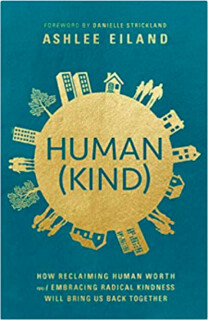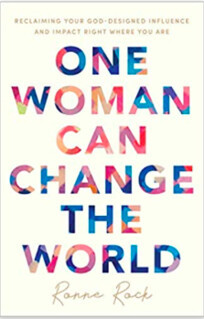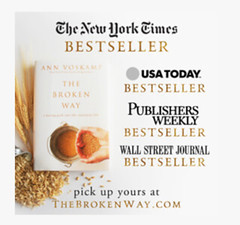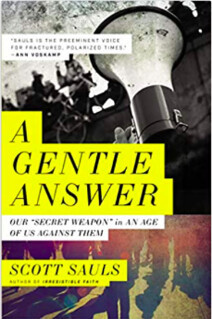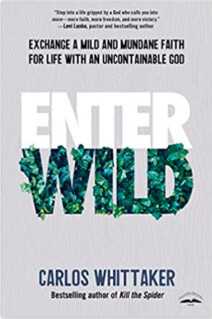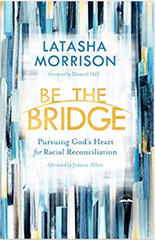Ann Voskamp's Blog, page 78
June 24, 2020
The Gift of Peoples’ Presence
Ashlee Eiland knows how life can be loud. Headlines, political divisiveness, racial injustice and 400 years of oppression – all loud. And the protestors aren’t the only ones crying out. The soil of our humanity, the foundations upon which we’ve deemed sufficient to support our stories and collective existence – it’s cracking. And that crack is earth-shatteringly loud. As a mom of three, as a pastor, as a neighbor, wife and friend – she wants her life to be about something that matters and will help heal us. But nowadays, she’s also pondering the role of silence. When is silence wisdom – and when is it complicity? When does silence serve her – and when does it show up to shoulder the burdens of her brother or sister? She’s still learning much about her voice, its power and its weight, but she’s also leaning into the gift of silence. Her hope for us is that we’re led in the best of both. That our loudness transforms and unifies; that our silence teaches and elevates another. May silence continue to teach and lead us into deeper soil: the soil of our own hearts and the places those hearts love loudly. It’s a grace to welcome Ashlee to the farm’s front porch today…
“How are you today, sir?” He looked up.
“Sir, I know it’s cold – and we just handed out the last of the meals we had. Can I walk you over to McDonald’s and get you something to eat? Your pick.”
He nodded once, then pushed himself off the wall, his wrinkled hands revealing traces of dirt underneath his fingernails and scabs that told stories of wounds that may have been more than physical in nature.
We walked silently, side by side, until we reached the shiny metal door of the McDonald’s off Alameda Street. As we shuffled inside, I saw two of my friends across the street, concern spread large and wide across their expressions, like Downton graffiti.
I offered a quick wave as if to say, It’s McDonald’s. I’m not going to die. And we disappeared underneath the golden arches, out of the cold and into the aroma of oiled and crispy French fries.
Second in line, I motioned to the board. “Pick anything you want.”








Still, he said nothing. He gazed longingly at the backlit board, his squinted eyes bright with possibility. They darted from one menu item to the next, ping-ponging from the nuggets to the Filet-O-Fish, back to the nuggets, and then to the flurries.
Finally, we inched forward, meeting our cashier face to face. Without looking at her, he said, “A Big Mac, please.”
She paused, waiting for another item. But nothing.
“There I was, a black girl in her early twenties, bundled up from head to toe, and a homeless man.”
“Will that be all?” She asked, looking at him, eyebrows raised in anticipation.
“Make that two,” I interjected. “Two Big Macs, please. And a large fry.” I didn’t want fries. But perhaps he did. I’d let him decide.
We waited at the side for our food and then found a two-top table in the middle of the restaurant, the perfect spot for curious eyes to inspect and dissect the situation.
I had to admit we were an unusual pair.
There I was, a black girl in her early twenties, bundled up from head to toe, and a homeless man.
I watched him eat his burger as I tried to position my nose where I wouldn’t smell the stench that started wafting from his outerwear. His mouth was rimmed with foamy spit that spread open with each bite. I thought he would eat quickly – four bites, tops. But he didn’t. He ate slowly, deliberately, with utmost care and savoring.
I watched him, eating hardly any of my meal at all, but fully aware that I’d need to either eat it or wrap it up and take it home. Throwing any food away seemed like a really insensitive thing to do.
“I was growing uncomfortable – not with him, I realized, but with the silence.”
As he took his second-to-last bite, the man slowed his chewing even further and shifted his gaze from the ceiling to me.
Without words, he cracked a smile and then looked down at his burger.
I was growing uncomfortable – not with him, I realized, but with the silence.
I wanted to know his name, his story.
I wanted to know how long he’d been homeless – how long it’d been since his last meal.
I wanted to know if he wanted any more to eat, if there was any other way I could help him.
Then, amid the buzz of kids laughing and playing in the PlayPlace, amid beeps from the deep fryer back in the kitchen and the soft rock tunes coming from the circular overhead speakers, I stopped.
Even with noise surrounding us, I heard a voice speak loudly to my heart: Stay silent. You don’t need to know those things. Just look at him. Just hold the space. Receive the gift of being able to hold the space.
My throat tightened as I tried to hold back tears. They came all at once, without warning. I was mourning his circumstances. I was struck by my own pride – my need to know everything that wasn’t mine to know at all.
I was suddenly grateful for the gift of being able to provide without pomp and circumstance, with just two plastic bags and a van full of college kids.
But most of all, those tears made me realize that I was being served.
“In that moment, at that table, in the silence,I was overjoyed to know that a man with nothing was giving me everything he had. He was giving me the gift of his presence.”
I was the one on the receiving end of the nourishment of silence.
I wasn’t living in the cold, but I was desperate to receive the warmth of human connection.
I wasn’t hungry, but I was starving for space, for the comfort in knowing that no words are needed to experience the fullness of being wholly alive.
I’d assumed I was the one doing the serving that day.
But in that moment, at that table, in the silence, I was overjoyed to know that a man with nothing was giving me everything he had. He was giving me the gift of his presence.
That meal was worth more than the four dollars I paid for it. Sitting across from this unnamed, unknown man, “unusual” became ordinary.
“Stranger” became safe. “Homeless” became hospitable.
And I left that table with empty plastic bags but a full heart, bursting with so much hope.
Ashlee Eiland serves as the formation and preaching pastor at Mars Hill Bible Church. She shares God’s message of redemption and reconciliation at conferences, colleges, and events around the country. Ashlee earned a BA in international relations from the University of Southern California and completed her master’s in organizational leadership at Judson University.
Long before polls, protests, and political issues divided us, we were joined by a humanness that God considered very good. Created in His image, we reflected the height and depth of God’s loving-kindness, but our discord has blinded us to the imago Dei in us all.
In this compelling collection of essays, Ashlee Eiland shares her story of being a black woman living on two sides of the fence: as the token black girl in majority-white spaces and as the “whitewashed” black girl in majority-black spaces. As she discovers her own unique worth through these recollections, Ashlee learns that extending radical kindness toward every person—regardless of social status, political views, or religious beliefs—gives us hope and rekindles our common humanity.

June 22, 2020
Our Own Worst Enemy
When I picture the character of Father God, I am drawn to His artistry— the way light, like hope, breaks through the darkness long before we see the full glory of a sun rising above the horizon, or how His fidelity made manifest in the tender way the seasons faithfully bring both rest and fruitfulness year after year. In thinking of the wonder of God’s creation, I tend to forget the masterpieces He has created in every single one of us. In her book, One Woman Can Change the World, Ronne Rock celebrates numerous women and their unique and beautiful design – reminding us that we are created on purpose for a purpose. It’s a grace to welcome Ronne to the farm’s front porch today…
“I pray that no one ever looks at my life and says, ‘That girl—you know, she always played it safe.’”
I wrote those words after returning from a season of travel in which I spent time with yet more women who turned my faith even further on its head with their boldly quiet and bravely effectual love for Jesus.
I don’t want to be a safe girl.
“I have a feeling you’re like me in that way. You want to be unafraid to be you too.”
I have a feeling you’re like me in that way. You want to be unafraid to be you too.
I want you to be you. I want you to be able to reclaim all of God’s beautifully crafted physical, emotional, intellectual, and spiritual DNA.
I want you to look in the mirror and saying with quiet confidence, “I am a woman, and all that I am is wonderful.”
But chances are there have been moments when you’ve thought, Well, if I lived in a foreign land, I’d be able to make a difference too.
Or If I was younger (or older), married (or single), funnier or smarter or wealthier, more creative, less encumbered, more like them and less like me . . .
Every single woman I have encountered has battled the same thing.
The real enemy of us is us.








It’s the way we view ourselves in light of the way we view others. It’s the way we rank ideals of beauty, talent, giftedness, purpose—and always place ourselves slightly lower than others.
If we are our worst enemy, then I believe comparison is our most destructive weapon.
“If we are our worst enemy, then I believe comparison is our most destructive weapon.”
Comparison rarely moves us to contentment. Rather, it pushes us toward competition or condemnation—or a fierce ping-pong match of both.
I’ve only traveled to St. Petersburg, Russia, in the winter, when the skies struggle to wake up before ten and are already darkening by early afternoon.
Canal ways fill with ice floes, and radiators in even the nicest hotels war with the damp cold outside. The city streets wind and connect like rivers, with every major thoroughfare leading back to statues of Peter the Great.
Peter was hungry to make his namesake city famous. He traveled throughout Europe in the late 1600s, taking note of style and nuance.
He wanted his city to be known as the window to Europe, the Venice of the north. He was so entranced with the idea of creating something more magnificent than all the magnificent somethings in other countries that he forgot to focus on the unique qualities of his own homeland.
St. Petersburg was built on thirty-two islands. More than three hundred bridges connect pieces of the city. Originally, Peter had visions of using all that water to mimic the canals of his Italian neighbor. His watery paradise would be bigger and better.
And so it was. Until winter came. In a city that’s as far north as Alaska, streets made of water don’t fare well in the bitter cold. Prior to that first winter, watery canals they were. But those canals froze.
“But risk that celebrates our unique identities is powerful and life changing.”
When spring came, waterways were filled with cobblestone and concrete. Peter’s dream became a symbol of what happens when we forget the beauty of our own identities.
Peter allowed comparison to fuel fierce competition and reckless risk. I, on the other hand, have at times abandoned risk by allowing comparison to feed my own condemnation.
But risk that celebrates our unique identities is powerful and life changing.
Culture may find its joy in capturing our attention with comparison and fueling competition and condemnation in the process.
Our childhood dreams may be seen as foolish, our present-day circumstances may not be ideal, but our lives are purposeful.
And the most important thing we can embrace about our God-designed influence and impact is our God-created identities.
Ronne Rock weaves themes of transformative hope and grace-filled leadership into everything she shares on page and stage. She’s an award-winning marketing executive who travels around the world to gather words and images that inspire others to action with Orphan Outreach, a global nonprofit dedicated to serving the orphaned and vulnerable. Ronne offers battle-tested wisdom about leadership, advocacy marketing, and finding God in the most beautiful and painful of circumstances.
One Woman Can Change the World is an honest look at what it means to be a woman of influence in a world that often doesn’t make leadership easy. It’s about leading with grace in cultures that aren’t always graceful. It’s about reclaiming all our God-given physical and spiritual DNA and allowing it to do its work in and through each of us.
[ Our humble thanks to Baker for their partnership in today’s devotions ]

June 21, 2020
What All Our Hurting Hearts Need Most this Father’s Day
I sat with a man once —
who told me about falling in love with a woman who was most alluring not in satin but in sweats,
her hair undone and falling, laughing about something long ago, her head thrown back and her neck arching bare and lovely.
He said that he couldn’t take his eyes off her when she was like that, vulnerable and unmasked. Maybe that’s what beauty is, the brokenness of bare exposure.
“What does it matter what people think of you when you know that you’re known by God?”
He said that’s all he ever wanted.
He wanted her. And he wanted to live unafraid because what does it matter what people think of you when you know that you’re known by God? Let people have their bloated opinions — he’d take God’s bottom-line approval any old day.
Thing was, every time he went to ask for her hand, to commit to a taking and holding gently a life like that, to daily daring to lay down for a life like that, some voice in the back of his rattling mind mocked him for thinking he was a man.
That he wasn’t man enough for a woman like her, that he wasn’t man enough for a brave life where souls lived unashamed and uncovered to each other, that he wasn’t man enough to live unmasked in a world of stiff suits and swaggering loud certainty.
So he’d gone to his dad.
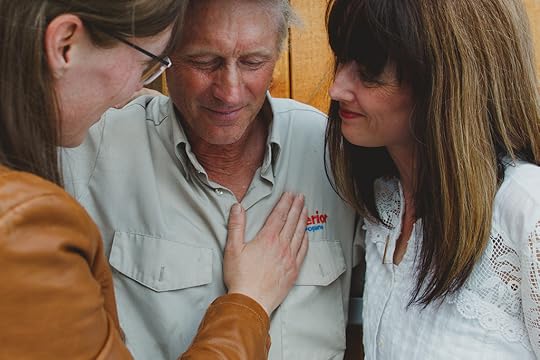 Joy Prouty
Joy Prouty

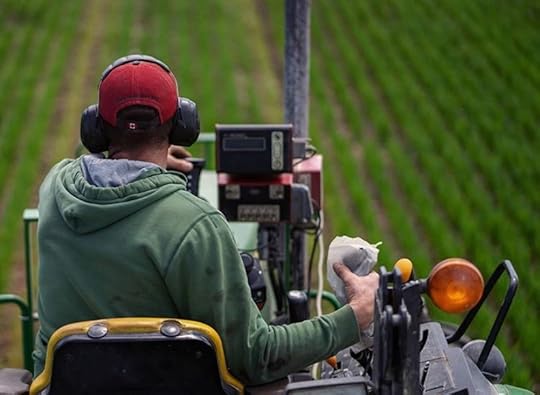
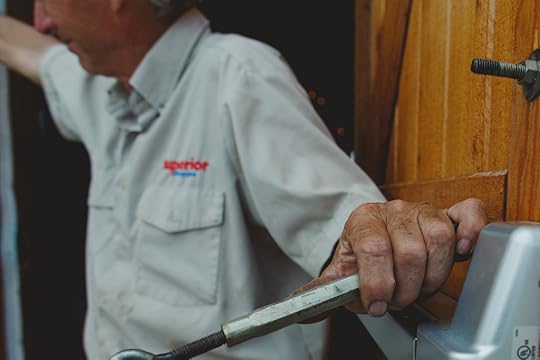 Joy Prouty
Joy Prouty

 Joy Prouty
Joy ProutyHe’d knew where to go — and it was back to his father.
Because a Father is the seed of your beginning, he is the catalyst of your being, the genesis of your becoming.
Because sometimes the only way to silence the voices in the back of your head is to stand face to face with your Father.
Because when we dream of making a life, dream of making a love that will make life, we return to the beginning. And and we pray for a moment when our Father leans close over our hoping to breathe the warmth of His willing self into us.
That is what makes him your Father: He is your beginning.
So he went and sat at his Dad’s table.
He looked his Dad in the eye and told him the life he wanted to have and to hold, about the woman he wanted to make a life with.
Told his Dad that there was something in him that said that there was something in him that wasn’t enough for her, a voice that told him that he wasn’t good for living vulnerable dreams, a voice that told him he was less than —his voice broke — that he was less than others, less than expectations, less than enough.
“Sometimes what you want most is your father to give you the greatest gift anyone can give someone: for him to believe in you.”
He’d looked his father in the eye and that was his Esau Moment.
It happens. And you don’t know when it will come, how often it will come: Every child, every man, every woman, has these Esau Moments when everything in them wants to beg a blessing from their father.
When you want the man that began you to bless you — to say that you are one of his dreams come true, that you are what he hoped for, you are his desires and love incarnated and there is nothing he will leave behind that compares to the masterpiece of you changing the world and everything coming ahead.
Sometimes what you want most is your father to give you the greatest gift anyone can give someone: for him to believe in you.
So that’s what he said — He looked into the face of the man who had given a part of himself to conceive him and he let the Esau words come:
“Dad — I need you to say that I’m enough of a man.”
I need you, Dad — to say that I am yours and you aren’t ashamed of me.
I need you, Dad — to say that I am loved and nothing I can ever do or fail to ever do will change how you forever love me.
I need you, Dad — to say that I am enough of a man.
And his father turned to him and said —
“I can’t.”
When I heard that that was what his father said? I could hardly breathe.
And then this happened:
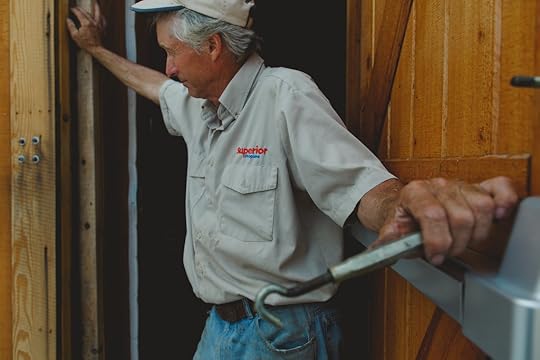 Joy Prouty
Joy Prouty

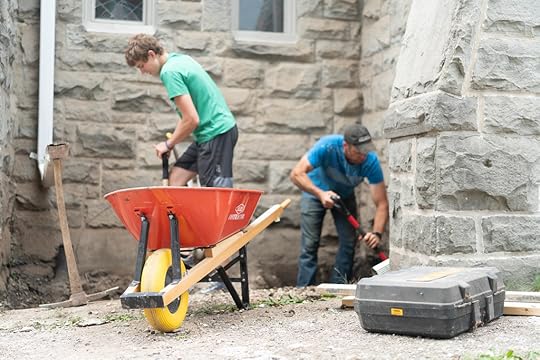
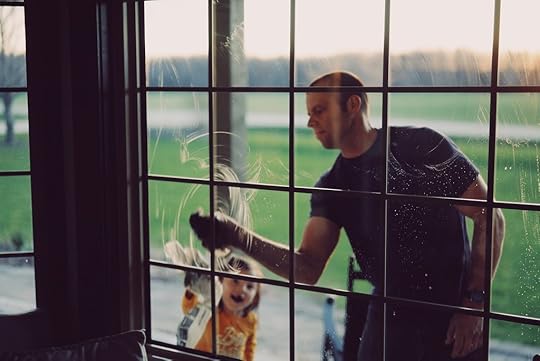



His father had said, “I can’t tell you everything you need me to say —
because my own father never said it to me.”
And he looked into the eyes of his own seeking father — and that’s what he felt:
For the first time in his life he felt all his wounds bleeding right there on the inner walls of his own father’s heart.
The Esau Moment of begging blessing had become an Epiphany Moment of softening—
His hardened dad was still but a broken boy who himself had never heard I love you.
His stiffened and masked dad was still a kid who himself had never gotten his own blessing.
His distanced dad was but himself a question still reaching across the chasm of generations, desperate to find something under fingers to touch, to believe in — and pass on.
Nothing wounds like the elusiveness of love.
“You can’t deeply love your parents — until you grieve the deep wounds of their life.”
But it can happen and it can be your tender miracle:
There can be an unspoken bond with the one who has wounded you — because you know you both carry the same wounds.
Hurt people, hurt people.
You can’t deeply love your parents — until you grieve the deep wounds of their life.
My own Dad looked different to me when I saw him that spring, when I saw his worn hands slipped into his Levi jeans, the way time silvered at his temples and his eyes tried to say things I knew his words never could.
I felt it like a slow thrum around the tender places — how there is nothing stopping me from being the voice that reaches across the chasm of generations, from me being the whisper of what he never heard from his own dad — but he could hear now from his own child.
I could be the one to say the words he’s always longed to hear:
“I love you. And nothing you’ve ever done or ever failed to do will change how I forever love you.
You’re mine and I’m not ashamed of you but I acclaim you for the battles you fought and won, for every struggle that counts as a win because you stayed in the game, you kept breathing and kept wrestling and kept getting up again.
You’ve never lost if you’ve learned. You’ve never failed if you’ve let your feet find the floor again come morning.
“And if I’ve loved redemption and grace and mercy for the likes of me, how can I love anything less for the wounds of yours?”
And if I’ve loved redemption and grace and mercy for the likes of me, how can I love anything less for the wounds of yours?
Love is patient and patience is a willingness to suffer — and simply, I choose to always love and suffer with you.”
And maybe there’s a way every kid can someday, maybe, get a little closer to the hope of saying that.
Maybe… maybe there’s a hope that someday, maybe, every one of the wounded can move closer to the healing of that:
Because when you look in the mirror, there it is, in the sheen of the lit reflection, and you recognize it — a glimpse of your own father’s face.
And that face sees their own father’s face who sees their own father’s face— and the reflecting washes over you and on and on until there’s the beginning and there’s a glimpse of the face of God.
And you hear the words your longing is guaranteed to hear, your Esau Moment becoming an Emmanuel Moment, because you, your father, his father — we all have a Father who is always with us, always blessing us:
“A Father’s most important job is to know his own heart is secondary to that of His children’s.”
“You’re the child I imagined and dreamed about and chose before creation, whose name I etched into the palm of my hands with dying affection,
You’re the one who I think about more than there are grains of sands on the seashore, the one I can’t stop singing love for.
You’re the one who gets what you want most, your Father to give you the greatest gift anyone can give someone: I believe in you — because I am in you so you can believe in Me.
You’re the one I made and will remake and will never forsake —
You are my child and I am Father and to love is to suffer, and I will suffer for you, and I will suffer with you, and I will carry you through till you suffer no more.
Bear my name and nothing you’ve ever done or ever failed to do will change how I forever love you.”
You can sit with that. You can heal because of that.
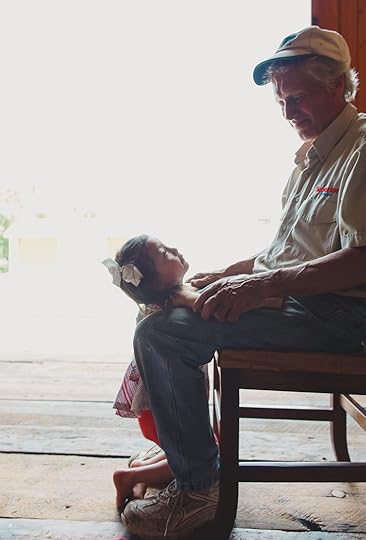 Joy Prouty
Joy Prouty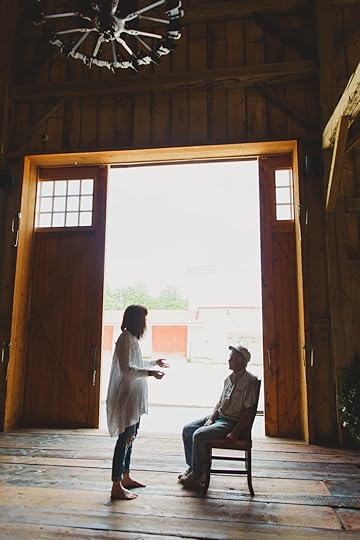 Joy Prouty
Joy Prouty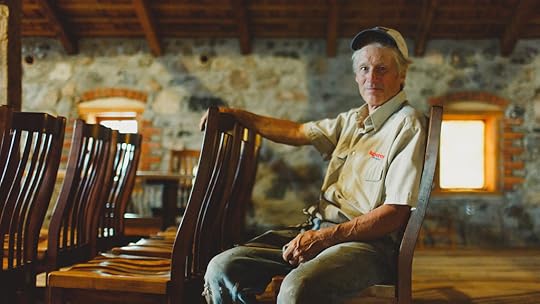 Joy Prouty
Joy Prouty Joy Prouty
Joy ProutyAnd you can look in the mirror and no matter what you know of your father on earth –– you can know of your Father in heaven: A Father’s most important job is to know his own heart is secondary to that of His children’s.
And your Father in heaven broke His heart for you on that Cross because His love for you is second to none.
And there you are —
You can exhale the relief of the awed grace of something you’ve longed for….
You have your Father and all you’ve ever really wanted —
the tenderest miracle of a redeeming Fatherhood at the core of the universe… at centre of all our seeking hearts.
Need someone to throw you a lifeline of grace?
This one’s for you.
Need some courage to begin again, to feel loved again?
This one’s for you.
Need the paradoxical, transforming secret to the abundant life?
Really: This one’s for you.
Pick up a copy of The Broken Way — and begin to experience the abundant life like you’ve always hoped.

June 20, 2020
Only the Good Stuff: Multivitamins for Your Weekend [06.20.20]
This weekend? Feels like we are walking into new hope, new change, new possibility!
Some real hope in these days — for us all to the real, sustained, needed work & more of the real Kingdom of God to come into a hurting world. Links & stories this week 100% guaranteed to make you smile a mile wide & believe like crazy in a Good God redeeming everything — and that there’s love everywhere & for ((you))!
Serving up only the Good Stuff for you & your people right here:
George Wheelhouse / Instagram
George Wheelhouse / Instagram
George Wheelhouse / Instagram
a weekend to walk and talk and ponder
(oh, and love that this photographer plants a tree for every print sold!?!)
reunions don’t get much better
Happy, Happy Father’s Day… had to share this favorite
Grace Is Needed Now More Than Ever
this is how we fight our battles
Sara Navarro
Children Answer the Question “What Makes You Happy?”
In the story of the Bible, God is depicted as a generous host who provides for the needs of his guests. However, humans live from a mindset of scarcity and hoard God’s many gifts. In this video, we explore God’s plan for overcoming our selfishness by giving the ultimate gift of himself in the person of Jesus.
grateful for the work of BibleProject
what an idea! 25,000 square feet of organic produce is grown atop this supermarket:
one outdoor photographers quarantined inspired creativity
as a transracial family, listening with my whole heart: 5 Things I Wish My White Parents Knew
so who knew? How fast can a vaccine be made?
IF: Lead 2020
We’re coming to you in your living rooms with a
one-day, digital event!
You are a leader. Whether you’re a mom, a boss, or a Bible study leader, you are influencing others around you. Let us equip and encourage you to continue using your influence for God’s glory with our annual leadership event, IF:Lead.
We want to personally invite you to pull together a few friends in your living room for a day of dreaming about the days ahead with this sisterhood of women God has given us called IF:Gathering on August 15. Tickets are on sale now! Invite your friends and join us online in August!
10 Reasons to Come Back to Church after COVID-19
honoring our fathers and praising our Heavenly Father…
#TellThemNow… say what you need to say today
thank you, Carlos Whittaker…
“This is the work at hand. Time to call it out in yourself and do the work inside your heart to end racism in you.”
Love kids? From the hear of the Father, for every child this Father’s Day… Maybe this is for you:
Sunday 21 June at 7pm — to think about the part you could play for vulnerable children #FindingHome
It’s a grace to be part of Home for Good’s special ‘at home’ Father’s Day broadcast – join us?
taking real time to really listen to a profoundly helpful explanation of systemic racism from Dr. Tony Evans
Thank you for your leadership, Dr. Evans…America’s racial crisis is a result of the failure of the church to deal with racism
The evangelical church needs to speak up where it has been silent on injustice and racism
10-year-old baseball fan pleads for baseball season to return
Do you raise your kids to be colorblind? THIS video
Chip & Joanna Gaines sit down with Emmanuel Acho to have an uncomfortable conversation about teaching their kids to “see color”… and when Emmie Gaines asks “Are you afraid of white people?” don’t miss
This unforgettable video is a celebration of the unseen mystery and wonder of life on earth
Turns out? All our homes tell a story.
Friends, today we celebrate World Refugee Day!
World Refugee Day is marked on June 20th each year to celebrate the courage and resilience of the tens of millions of people forced to flee their homes due to war or persecution. We are now witnessing the highest levels of displacement on record.
Will you help us celebrate our refugee artisans?! When you support our artisans by purchasing their handmade items, not only are you providing dignified jobs — you also are making a statement — Refugees, we welcome you. You. Are. Welcome. HERE.
Wherever there is a place of Grace — we find more of Home. Come see.
Take Me Back

Books for Soul Healing:
Joy is actually possible, right where you are.
Take the dare to discover: Life is not an emergency…Life is a GIFT.
Life is too short to do anything but truly savor it — to count all the ways you truly loved.
What if Brokenness is the Path into the Abundant Life?
You don’t have to be afraid of broken things — because Christ is redeeming everything.
There’s no other authentic way forward — but a broken way — right into a profoundly abundant life.
Journey into a deeply meaningful life with this devotional and take sixty steps from heart-weary brokenness to Christ-focused abundance. The Way of Abundance — is the way forward every heart needs.
Be the Gift is a tender intivation into the next step of deeper transformation, less stress, more joy and abundantly more peace & purpose. You only get one life to love well…to Be The Gift.
Where is Your Faith? – Luke 8 Meditation by Tim Keller
on repeat this week: The Bay Area Blessing — Churches sing ‘The Blessing’ over the San Francisco Bay Area
…so here’s the thing: Every single person around you, everyone you meet, everyone you cross paths with today, every single one is fighting their own hard fires — so what if all decided to just be real gentle with one another today?
What if we could say it together, like one Body, say it all together to each other because there is not even one of us who hasn’t lost something, who doesn’t fear something, who doesn’t ache with something. So what if we turn to the hurting, to each other, and promise it till we’re hoarse:
“We won’t give you some cliche — but something to cling to — and that will mean our hands.
We won’t give you some platitudes — but some place for your pain — and that will mean our time.
We won’t give you some excuses — but we’ll be some example — and that will mean bending down and washing your wounds. Wounds that we don’t understand, wounds that keep festering, that don’t heal, that down right stink — wounds that can never make us turn away.
Because we are the Body of the Wounded Healer and we are the people who believe the impossible — that wounds can be openings to the beauty in us.”
Let’s be the brave and speak up, speak the Truth and Love:
Shame is a bully and Grace is a shield. You are safe here.
Write it on walls and on arms and right across wounds:
“No Shame.
No Fear.
No Hiding.
Always safe for the suffering here.
You can be different and you can struggle and you can wrestle and you can hurt and we will be here. Because a fallen world keeps falling apart and even though we the Body can’t make things turn out — we can turn up. Just keep turning up, showing up, looking up.”
If we only knew what fire every person is facing — there isn’t one person we wouldn’t help fight their fire with the heat of a greater love.
[excerpted from our little Facebook family … come join us each day?]
That’s all for this weekend, friends.
Go slow. Be God-struck. Grant grace. Live Truth.
Give Thanks. Love well. Re – joy, re- joy, ‘re- joys’ again
Share Whatever Is Good.

June 17, 2020
Hate Cannot Drive Out Hate: Only Love Can Do That
Scott Sauls is the preeminent voice for fractured, polarized times. No voice speaks with such fresh hope, clarifying wisdom, rooted orthodoxy, all from a posture of unifying grace. I have said often that books by Scott Sauls should be in the hands of every single Christian without exception. About Scott’s latest offering, A Gentle Answer: Our ‘Secret Weapon’ in an Age of Us-Against-Them, Paul Tripp has said, “In a culture that glories in outrage, I can’t think of a more needed and timely book than this one.” Very few pastors or theologians have more spiritually formed our family than Scott, and his every word is read under our roof. And very few books could change the conversation around our office watering holes, our family dinner tables, and across our aisles and fences across the globe like this one. And so, it gives us joy to welcome our friend, Scott Sauls, to the farm’s front porch today…
The man Nathanael was skeptical of Jesus, until he wasn’t.
As others speculated about whether or not Jesus was the long-awaited Messiah, Nathanael famously asked, “Can anything good come out of Nazareth?” (John 1:46)
Nazareth, the place of Jesus’ upbringing, was a small and obscure town, not known for churning out movers and shakers, let alone the King of the World. Based on place of origin alone, Nathanael wrote Jesus off.
But this skeptic’s posture swiftly shifted when Jesus, whom he had never actually met, declared, “I saw you under the fig tree,” to which Nathanael responded, “Rabbi, you are the Son of God; you are the King of Israel!” (John 1:48-49)
Why the sudden shift? What, exactly, did Jesus see under that mysterious fig tree?
It could have been something wonderful , like a hidden virtue.
Perhaps Nathanael had been praying under the tree, or making a vow, or feeding a hungry man, or defending a weaker person against a bully, or donating new clothes to a poor woman, or talking a teenager out of committing self-harm, or forgiving an enemy.
Or Jesus could have seen hidden pain in Nathanael under that fig tree.
Perhaps it was the place where Nathanael first became a victim of abuse, cried out to a silent sky about how lonely he was, or tried to end his own life, or felt the despair of anxiety or depression or financial ruin, or was given a crippling diagnosis, or was abandoned by his wife, or buried a child.
Or Jesus could have seen Nathanael committing a heinous sin that was hidden from the rest of the world.








Perhaps beneath the fig tree was where Nathanael berated and bullied a child, or committed a crime, or passed out drunk, or told an injurious lie, or committed a murder, or solicited a prostitute, or committed blasphemy.
We just don’t know what Jesus observed in that moment.
However, when Nathanael responded in awe over the fact that Jesus had seen him under the fig tree, Jesus assured him that the best was still to come: “You will see greater things than these.” Indeed, Nathanael would see heaven opened and the angels of God ascending and descending on the Son of Man (John 1:50-51).
In other words, Nathanael would see the face of God, in all of His glory and splendor.
“What are these greater works that Jesus spoke of?”
Philip, the friend who first introduced Nathanael to Jesus, was also promised greater things. When Philip later asked Jesus to “show us the Father,” Jesus responded, “Truly, truly, I say to you, whoever believes in me will also do the works that I do; and greater works than these will he do” (John 14:12).
What are these greater works that Jesus spoke of?
What could be an even greater work than turning water into wine, walking on water, telling a paralytic to rise up and walk, or giving sight to a blind man?
Perhaps the greater works are things such as Nathanael the cynic becoming a loyal follower who calls Jesus Rabbi, or a wavering Peter doing something courageous and bold, or a poor widow giving away her two coins at the temple, or a violent and racist Saul becoming a reconciling mediator between Jews and Gentiles.
Perhaps greater works are the works done in our own lives through Jesus’s strength, such as loving one person for better and for worse, in sickness and in health, in joy and in sorrow, as long as we both shall live.
Perhaps greater works include saying no to a doctor’s recommendation to abort a child with special needs and yes to raising and loving that child.
Perhaps greater works include pursuing understanding, reconciliation, justice, peace, and friendship with people from another race, culture, political persuasion, economic group, or generation whom you wouldn’t otherwise be able to get along with outside of Christ.
Perhaps greater works include staying at the same church for years or even decades, even during seasons of difficulty or decline.
“Perhaps greater works are the works done in our own lives through Jesus’s strength, such as loving one person for better and for worse.”
Or perhaps greater works include responding to hurtful treatment with a gentle answer that turns away wrath. (Proverbs 15:1)
In the fall of 2006, a Pennsylvania milk truck driver named Charles Carl Roberts IV burst into a one-room, Amish schoolhouse and opened fire on a classroom of girls, killing five and severely injuring five more. After this, he turned the gun on himself and took his own life.
In his suicide note, Mr. Roberts confessed that he had been secretly tormented for many years by two dark spots from his own past.
The first was the memory of how he had molested two of his younger relatives twenty years before. The second was the memory of losing his own daughter, who had died nine years previously. The loss of his child led Mr. Roberts to also confess in his note that he hated God.
There were two groups of people in attendance at his funeral.
The first was the expected group: his family and friends of his family, who sat somber and shocked over what had happened. The second was a group of about thirty men, women, and children from the Amish community whose daughters Roberts had murdered and injured.
Commenting on the series of events, nearby sociologist and college professor Donald Kraybull remarked that “the most powerful demonstration of the depth of Amish forgiveness was when members of the Amish community went to the killer’s burial service…Several families, Amish families who had buried their own daughters just the day before were in attendance and they hugged the widow, and hugged other members of the killer’s family.”
It was also reported that this Amish community had donated money to cover expenses, including funeral costs, for the killer’s widow and three children.
Then, as would be the case for any community after enduring such horrific loss, the Amish returned home where they would be “better able to concentrate on the work of their own healing.”
“To gain strength and courage to offer a gentle answer, we must first be flooded by the reality that we’ve already received one.”
When I first read this modern-day account of “greater works than these,” I couldn’t help but remember the famous quote from Dr. Martin Luther King Jr. as he eloquently explained the rationale behind his philosophy of protesting injustice by acts of peaceful resistance.
King said, “Returning violence for violence multiplies violence, adding deeper darkness to a night already devoid of stars. Darkness cannot drive out darkness: only light can do that. Hate cannot drive out hate: only love can do that.”
This is a gift of love packaged in a gentle yet powerful answer.
How do imperfect, frail human beings find the resources to heal from distancing and rejection, to respond to such violence with such love, and to commit to “work on their own healing” instead of retaliating with their own forms of aggression?
I believe the answer rests in a short statement made by the beloved disciple, John, who said that we love (even our enemies) because Jesus first loved us (1 John 4:19).
Paul, likewise, reminds us that we only have the resources to forgive others because Christ has first forgiven us (Eph. 4:32).
To gain strength and courage to offer a gentle answer, we must first be flooded by the reality that we’ve already received one .
Scott Sauls is senior pastor of Christ Presbyterian Church in Nashville, Tennessee, where he lives with his lovely wife, Patti, and daughters, Abby and Ellie. He blogs regularly—seriously bookmark him—and can be found being humble light on Twitter, Instagram, and Facebook.
About A Gentle Answer, Jen Pollock Michel has said, “This is an urgent book for our fractured times, calling us to rigorous self-examination and the gentle way of Jesus. Sauls is just the kind of voice we need in evangelicalism today.”
I humbly concur. A Gentle Answer is a roadmap, first into the gentle heart of Jesus, and then into a world that is aching for a gentle answer to bring relief from the hostility and noise. This is an absolute must-read that I cannot recommend highly enough.

June 15, 2020
Is there more to this Christian life than we have experienced?
Carlos Whittaker is a voice we need right now. A voice who speaks truth and calls us to live life abundantly and to the fullest. He shares his life and stories through vulnerability and humor, and you can’t help but to be drawn in. In his latest release, ENTER WILD, he reminds us that we don’t have to wait until heaven to experience God’s best. Even in the midst of our broken world’s traumas and trials, we can hear from God, experience victory, and believe His promises. We CAN experience John 10:10 today! It’s a grace to welcome Carlos Whittaker, to the farm’s front porch today…
guest post by Carlos Whittaker
Is there more? Is there really, truly more to this Christian life than we have experienced?
John 10:10 says this: “The thief comes only to steal and kill and destroy. I came that they may have life and have it abundantly” (ESV).
This verse, this verse. This verse has confused more people than I can count.
Is God’s promise of life to the full real? Is His promise of abundant life an actual thing? Is His presence actually something we can tangibly enjoy on a daily basis?
The simple answer is yes. The more complicated answer is also yes.
Look, the offer we have been given by God Himself is this: a life that is filled with heart-pumping, joy-releasing, victory-claiming, beauty-experiencing fullness!
Now will all that be opposed? Of course. Opposed by what?








Well, Scripture tells us there is an enemy in our midst who is not out to borrow, push, or upset. No, the Enemy is out to steal, kill, and destroy. But we have been given all the tools we need to fight and win.
How is it possible that John 10:10, a verse meant to give us freedom, has so confused us? It’s not the scripture’s fault. Obviously.
“The Enemy is out to steal, kill, and destroy. But we have been given all the tools we need to fight and win.”
Just reading it, taking it at its word, is so life giving. But it’s been taught incorrectly. Much of the pain comes in misunderstanding the meaning of the word abundance.
That is where so many Christians get tripped up. And I know why. It’s the gold. The shiny, gaudy gold. At least it was for me.
Is the Blessing for Me?
When I was growing up, we often drove past the TBN (Trinity Broadcasting Network) headquarters in Costa Mesa, California, off the 55 Freeway. My family would drive by in our 1981 Buick Regal, and I would stare in absolute awe and wonder.
Five-year-old me was enamored with the gaudiness of it all. If you haven’t ever seen it, imagine for a second if you combined Caesars Palace in Las Vegas, the Taj Mahal in India, and Daddy Warbucks’s mansion in the 1982 film version of Annie. Yep. That’s exactly what it looked like. I was constantly looking for Punjab (Annie’s rescuer) to be standing on one of the balconies as we drove by.
“Daddy? Who lives in there?” I once asked my dad.
“Oh, Carlitos. Nobody lives there. That’s a Christian TV station,” he responded.
A Christian TV station? My little mind would spin.
We were Christians, but I didn’t know any Christians who had digs like that. Maybe Christian movie stars?
I mean, isn’t that who worked there? Christian celebrities? Probably. And we were not that.
My dad was the pastor of Primera Iglesia Bautista de Pico Rivera or First Bilingual Baptist Church in Pico Rivera, California.
There was absolutely nothing about our lives that matched that place, at least from what I could see. I’d never seen the inside though. Maybe just the exterior was fancy.
“Dad? What does the inside look like?”
When we got home, he showed me. He turned on TBN. I think it was channel 56. Bill Gaither was singing “The King Is Coming” with a few other men in white suits, and there were lots of old people crying as they sang along.
They were singing on gold microphones in front of gold columns and these massive red velvet chairs with gold trim. The floor was marble, and there were these two people sitting behind the quartet mouthing every single word.
“Who are they, Daddy?” I asked.
“They are like the pastors of the TV station, Carlitos.” They were like my dad!
I can literally feel the emotion as I type, the hope and desire that began to creep into my chest. Was this sort of lavishness made for us too?
Maybe we would have this one day. My dad was the pastor. He loved God. This had to be the goal. Right?
I started watching TBN when nobody else was around. The lady pastor, the woman with the big hair and all the makeup . . . she was so pretty and so confident.
She would stare into the camera and say stuff that made me feel like God was on my side. Her words made me confident I would have all that Daddy Warbucks stuff, too, someday. I didn’t necessarily know what “sow a seed” meant, but as a child I wanted to do that if it meant my familia would end up with all that swag.
Is this it? Is this what Jesus was talking about in John 10:10? This bougie life I saw on TBN? And if John 10:10 is for real, then why is life so insanely hard?
You pray for that promotion, someone else gets it. You pour your blood, sweat, and tears into a dream, and it fails to turn out.
You try counseling to fix your marriage, and your spouse doesn’t want it as bad as you do.
You are believing for physical healing; your symptoms get worse.
You lean into your faith like you never have before, reading the Bible, praying every morning, going to church every week, listening only to Christian music—you are doing it all right—but it all seems to fall short of the promise.
You hear sermons talking about freedom and abundant life, of peace that passes all understanding, but this stuff never seems to materialize for you. It seems like an unattainable goal, and life is just so unrelenting.
How can we live the truth of God’s promise while on this side of heaven? It seems impossible.
But, friends, we have mistakenly defined abundant life to mean a better job, more money, a fixed marriage, that house you’ve been dreaming about.
“Abundance has nothing to do with accumulating things and everything to do with accessing the King.”
No. Although those are great and fantastic things that God may give to us, those are not what John 10:10 is referring to.
We have to switch our definition to mean abundance no matter your job.
Abundance no matter how much money you have.
Abundance no matter your marital status.
Abundance no matter your living conditions.
What does Jesus mean when He speaks of abundant life?
It’s clearly not a nice little life.
Abundance has nothing to do with accumulating things and everything to do with accessing the King.
Carlos Whittaker is a People’s Choice Award winner, a former recording artist signed to a major label, a social media maven, and currently spends the majority of his time writing books and speaking on stages around the world. Currently Carlos is regularly teaching at churches and conferences worldwide. Including Catalyst Conference, Embrace Church, FreshLife Church, and many more.
In Enter Wild: Exchange a Mild and Mundane Faith for Life with an Uncontainable God, Carlos teaches how you are meant to receive the abundance God promises here and now. You are not meant to wait until heaven to experience His best. Even in the midst of our broken world’s traumas and trials, you can learn to lower the volume of life and truly hear God, experience what it means to speak God’s Word over yourself for real victory, and discover how to pray His promises instead of praying over the problems.
With his trademark blend of humor and transparency, gifted storyteller Carlos shares his personal struggle in coping with crippling anxiety—and how the key to his freedom was rediscovering a wild faith. That key can be yours, helping you open the door to leave mild and enter wild.
[ Our humble thanks to Waterbrook for their partnership in today’s devotion ]

June 13, 2020
Only the Good Stuff: Multivitamins for Your Weekend [06.13.20]
This weekend? Feels like we are walking into new hope, new change, new possibility!
Some real hope in these days — for us all to the real, sustained, needed work & more of the real Kingdom of God to come into a hurting world. Links & stories this week 100% guaranteed to make you smile a mile wide & believe like crazy in a Good God redeeming everything — and that there’s love everywhere & for ((you))!
Serving up only the Good Stuff for you & your people right here:
Esther Havens Mann
Esther Havens Mann
Esther Havens Mann
come along for a quiet walk right here to listen and ponder
because we all need a friend to dance with
Start Right Here…Change me first Lord, then let me be part of the change.
good stuff! 5 Bad Morning Habits You Should Quit Right Away
this is everything right here: ‘Born Again by the Power of Jesus’: Dozens of People Saved, Healed at Intersection Where Floyd Was Killed
“This moment is our inheritance as the Church”… humble thanks, brother
It’s a grace to be part of Home for Good’s special ‘at home’ Father’s Day broadcast – join us?
Sunday 21 June at 7pm — to think about the part you could play for vulnerable children #FindingHome
We believe in the power of story. Our film Just Mercy, based on the life work of civil rights attorney Bryan Stevenson, is one resource we can humbly offer to those who are interested in learning more about the systemic racism that plagues our society.
For the month of June, #JustMercy will be available to rent for free on digital platforms in the US.
Nurses’ musical voices give comfort in midst of pandemic
“It was all I could do to keep singing, but I did. But, you know, it’s times like that music and this job just go hand in hand.”
wow…what happens between nurses and firefighters in this community at 7pm every night?!
come see! Teen who cleaned up after protest rewarded with car
fascinating: Glasswing Butterflies – hiding in plain sight
THIS: Pastor Makes His Own Mask and Gives Away His Own Food to the Poor in His Community
“God is working. God is moving…”
I mean – watching this was heart fireworks. Only God write stories like this. What if we all loved like this? #BeTheGift
How to Pray for Your Kids This Summer: New Season, New Prayer Requests
There’s a crack in everything for a reason: how else can the light get in?
thank you, Randy Alcorn… Empathize with Good Cops in This Time of Rightly Calling out Bad Ones
glory, glory, glory
This book. We keep copies of this book always close, at the table, the bedside, because of the prayers…
And now Latasha Morrison and Be The Bridge have a new podcast for us to list to! A place to grow and learn in the space of racial literacy
Be The Bridge: Empowering people and culture toward racial healing, equity and reconciliation
tears… The Irish Blessing – over 300 churches joined up to give us this…
For Better or Worse: The Surprise Blessing of a Simple Wedding
…thanks to the pandemic, short engagements and small budgets and simple ceremonies—by far the norm for most of human history—may be making a comeback, at least temporarily.
some interesting perspectives on the new normals ahead
THIS: A look at the historic fight for justice through the eyes of a reporter
powerful moments of grace and unity you may have likely missed
…these days are tender and raw and hard to navigate. Polarizing issues can fuel an us-against-them culture, and differences of opinion quickly flare into angst, suspicion, and anger.
This preeminent voice, a real friend, can lead us into a better way.
No joke, this is the message we all need, for such a time as this:
Prize Worth Fighting For

Books for Soul Healing:
Joy is actually possible, right where you are.
Take the dare to discover: Life is not an emergency…Life is a GIFT.
Life is too short to do anything but truly savor it — to count all the ways you truly loved.
What if Brokenness is the Path into the Abundant Life?
You don’t have to be afraid of broken things — because Christ is redeeming everything.
There’s no other authentic way forward — but a broken way — right into a profoundly abundant life.
Journey into a deeply meaningful life with this devotional and take sixty steps from heart-weary brokenness to Christ-focused abundance. The Way of Abundance — is the way forward every heart needs.
Be the Gift is a tender intivation into the next step of deeper transformation, less stress, more joy and abundantly more peace & purpose. You only get one life to love well…to Be The Gift.
Ephesians 1:3–6 // Part 1 // Studying the Bible as Worship
When it sparks hope around the world — it sparks joy in our homes
Here at The Grace Crafted Home we are pre-selling our July Grace Flame candle!
Each Grace Flame candle is lovingly hand-poured by Muna and her mother Nadja, Syrian refugees resettled in Houston, Texas, in 2019 after fleeing war in their home country.
*100% — every penny — of your Grace Flame subscription is giving grace back to those in need.*
Wherever there is a place of Grace — we find more of Home.
on repeat this week: You keep on getting better… (just so good!)
…so it’s not trending or hip, maybe there’s no slick ad campaigns and it isn’t self-help pop psychology — but no matter what the world’s peddling today… you want the Word.
“Everything’s falling apart on me, God; put me together again with your Word.” Psalm 119:107 MSG.
Without the lens of the Word, the world warps.
Steep in it, meditate on it, return to it, carry a verse of it, don’t begin the day without it. We don’t read His Word to get God’s love… we read it to get in a place where we can *feel God’s love* for us again.
The power to change your life is in His Word — Stay in it…and you will be moved.
[excerpted from our little Facebook family … come join us each day?]
That’s all for this weekend, friends.
Go slow. Be God-struck. Grant grace. Live Truth.
Give Thanks. Love well. Re – joy, re- joy, ‘re- joys’ again
Share Whatever Is Good.

June 12, 2020
You Don’t Have to Chase Shadows Anymore
I have been a student of Dr. Derwin Gray’s leadership for some time now. He has a humble way about him that draws people in and makes them feel seen. He is focused in his mission to bring all ethnic groups together into one family as that is God’s heart. Regarding his latest book, The Good Life: What Jesus Teaches About Finding True Happiness, my dear sister, Beth Moore says, “Prepare to learn and be challenged. Get ready to grow and be stretched and go ahead and thank God in advance that, if you’re willing, you are about to enter a happier, more fulfilling life.” True happiness and the good life is available to us, and Dr. Gray points the way. Please help me welcome Dr. Derwin Gray to the farm’s front porch today…
As a little boy growing up on the west side of San Antonio, Texas, I loved chasing my shadow.
Back in the late 1970s, children didn’t have smartphones or tablets to entertain us, so we played outside, making up games as daylight slipped into night.
Chasing my shadow always started fun, but the enjoyment soon faded into frustration when I realized I could never catch it, no matter how fast I ran.
Trying to find lasting happiness is like chasing your shadow; what starts as childish fun erodes into adult frustration.
“Trying to find lasting happiness is like chasing your shadow; what starts as childish fun erodes into adult frustration.”
At some point in our lives, we realize no matter how hard and how long we work, we will never catch lasting happiness.
If there were a picture of the American Dream on Wikipedia, it would be of my big ol’ head.
I’m the son of two African American teenagers from the hood. My parents brought me into the world at a time when heroin and crack flooded poor communities.
I experienced things no child should ever have to experience or even know about.
But I had a dream.
During my freshman year of high school, I was inspired by a senior football player. He earned a football scholarship to a major university, and if that wasn’t enough, the prettiest girl in the school was his girlfriend. He was living the good life—he was happy.
And I wanted to be happy too.





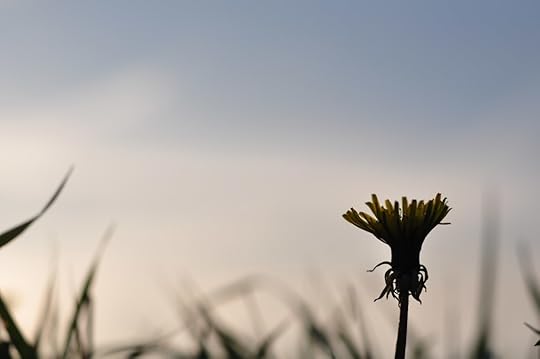



During my sophomore year, I transferred to Converse Judson High School, a football dynasty. As I bought into Judson’s culture, I went from a scrawny, weak, slow kid to a strong, muscular, fast, elite athlete garnering the attention of college football scouts. Eventually, the dream came to fruition. I accepted a football scholarship to Brigham Young University (BYU).
Provo, Utah, where BYU is located, is breathtakingly beautiful. The campus is situated below the majestic Wasatch Mountains. As a South Texas kid, the beauty of Provo captured me. But then I saw something more beautiful than the mountains—a girl with a long ponytail lifting weights in the BYU athletic weight room. We exchanged phone numbers and, well, the rest is history. Vicki and I have been together ever since. On May 23, 2020, we celebrated twenty-eight years of marriage.
“With more than fifteen years of counseling experience, I have learned that both those who follow Jesus and those who do not are longing and desperately searching for happiness.”
My BYU experience was great. I’m recognized as one of the greatest players ever to have played at BYU, and I married Superwoman. My dream came true, and I was living the good life.
I was happy . . . at least for a little while.
On April 25, 1993, the Indianapolis Colts drafted me as the 92nd selection in the NFL Draft. It was surreal. I did it. I was living the American Dream. The good life and happiness will be mine, I thought.
But just like chasing shadows as a little boy, I really wouldn’t be able to truly catch lasting happiness.
My first year in the NFL was miserable. I didn’t have many friends on the team. I was barely playing. Some of my teammates didn’t like me because my wife was white. My wife and I were both lonely. We wanted to go back to BYU where I was a beloved star.
My second year was better, and by my third year, I was the Special Teams Captain. I was now a valuable member of the team, and people in the city knew me for my community service. But the happiness that I wanted continued to elude me.
Don’t get me wrong; there were happy moments; but like you, I was looking for a happiness that was more than just feeling good from time to time. Like you, I wanted a happiness deeper, better, and more real than that.
My story of seeking happiness in jobs, relationships, fame, and money is not much different than most people in our culture.
As a pastor, I see a lot of unhappy people. With more than fifteen years of counseling experience, I have learned that both those who follow Jesus and those who do not are longing and desperately searching for happiness.
What if the happiness we are hustling after can never be caught?
What if the happiness we are running ourselves into physical, mental, and emotional exhaustion for is inferior to the happiness we’ve been made to experience?
What if created things were never meant to make us happy in the way we desire to experience happiness?
What if happiness is found by gazing into the face of God in Jesus Christ, and walking in His path of light, life, and righteousness?
“What if happiness is found by gazing into the face of God in Jesus Christ, and walking in His path of light, life, and righteousness?”
For thirty-three years, Jesus was happiness personified. He came to earth on a mission of reconciliation, with a royal invitation in his bloody, nail-pierced hands. He was inviting us to experience His kind of happiness, as citizens in His kingdom. Here’s the invitation card:
“Blessed are the poor in spirit, for the kingdom of heaven is theirs.
Blessed are those who mourn, for they will be comforted.
Blessed are the humble, for they will inherit the earth.
Blessed are those who hunger and thirst for righteousness, for they will be filled.
Blessed are the merciful, for they will be shown mercy.
Blessed are the pure in heart, for they will see God.
Blessed are the peacemakers, for they will be called sons of God.
Blessed are those who are persecuted because of righteousness, for the kingdom of heaven is theirs.” (Matt. 5:3–10)
The Beatitudes are what love looks like in action.
Often people wonder what it looks like to “love my neighbor.” Jesus’ audience would have known from the writings in the Old Testament such as Leviticus 19:9-18.
Here’s my paraphrase:
In response to God’s generous love, generously provide for the poor.
In response to God’s grace, don’t take what’s not yours or lie to people for dishonest gain.
In response to God’s kindness, treat people kindly; if not, you are dishonoring God’s name.
In response to God’s mercy, don’t oppress people by cheating them financially.
In response to God’s goodness, protect those with special needs and those who are marginalized.
In response to God’s justice, don’t suck up to the rich while being unfair and unjust to the poor.
In response to God’s truth, don’t slander or gossip about people.
In response to God’s forgiveness, forgive those who have hurt you.
In response to the cross, do not carry a grudge; it’s far too heavy. Give it to Me. You’ll be happier.
“You don’t have to chase shadows anymore. Jesus—happiness Himself—is chasing you.”
I am the Lord, your God. Love people the way I have loved you; this is why I made you. Don’t worry—if you rest in me, my strength will be yours. I’ll do this in you and through you. I am the Lord, your God. I am good. I will give you my goodness. This is the good life.
To love our neighbors is to love God. To love God requires that we love our neighbors.
Two thousand years ago, on a hill over the Sea of Galilee, our good King invited us to discover the happiness we long to experience.
The invitation still stands.
You don’t have to chase shadows anymore. Jesus—happiness Himself—is chasing you.
Are you ready?
Dr. Derwin L. Gray is the founding and lead pastor of Transformation Church, a multiethnic, multigenerational, mission-shaped community located in Indian Land, SC. Derwin played professional football in the NFL for five years with the Indianapolis Colts (1993-1997) and one year with the Carolina Panthers (1998). Derwin went on to graduate magna cum laude from Southern Evangelical Seminary with a Master of Divinity (M.Div.) degree, with a concentration in Apologetics. In 2015, he was awarded an honorary doctorate from Southern Evangelical Seminary. In 2018, he received his Doctor of Ministry in the New Testament in Context at Northern Seminary.
He has written several books, the latest being The Good Life: What Jesus Teaches About Finding True Happiness. In this book, Derwin teaches through the beatitudes and how happiness is found not in created things but in the Creator forming us into the image of Christ.
What is true happiness, and how can we find it? Everyone wants to be happy. We spend our money, time, and energy chasing after “the good life,” and we run ourselves into physical, mental, and emotional exhaustion on the way. But what if the happiness we’re all striving for isn’t the happiness we were created for?
Dr. Derwin Gray believes there is a path to true happiness. It is a life lived with Jesus by embracing the Beatitudes found in Matthew 5:1-12. As you walk through these words, Jesus invites you into a new life-giving rhythm that cultivates a flourishing, happy, transformative life. Discover the good life you were meant for.

June 10, 2020
How Acknowledgment and Lament Lead to Healing
I first met Latasha Morrison in 2014 at the IF:Gathering and since then have been able to spend time with this brave teacher, leader, and unifier around the world. Whether sharing the stage locally or serving and learning together in places like Uganda and Rwanda, Latasha’s heart for biblical justice is changing the church. She’s a kindred soul I’m thankful to also call friend. With bravery and genuine hope, Tasha calls us to something deeper and truer for God’s kingdom. It’s an honor to serve alongside her and to welcome Tasha to the farm’s front porch today….
guest post by Latasha Morrison
Growing up, I felt a great divide between my mom and me.
We were emotionally detached and distant.
Things came to a head in college as I sat on my bed and tried to remember whether my mom had ever told me she loved me.
I knew she loved me, of course, but had she ever verbalized it? Looking back over my childhood, though I had everything I needed, I felt something was missing.
And because my dad was more verbally expressive, because he told me all the time how much he loved me, the lack of verbalization from my mom stood out even more.
“Why could she barely bring herself to hug me?”
Was something wrong with her? Was something wrong with me?
Why could she barely bring herself to hug me?
And why did her siblings find it difficult to express love too?
In college, as a new follower of Christ, I began to process my childhood. I acknowledged the things that were holding me back in my relationships with others, this issue with my mother being primary among them.
I began watching the interaction between my friends and their mothers, seeing how they expressed their love verbally and physically, and I wanted this sort of relationship with my mom.
As time passed and I grew in spiritual maturity, I began expressing love to my family members.
I regularly told my dad I loved him and made sure my brother understood how much I loved him. I told my grandmother and grandfather.
But what about my mother? What was it about our family dynamic that kept me from telling her I loved her?



 Tasha Morrison
Tasha Morrison




Months passed and I eased more and more into the practice of expressing love.
One day I decided I was going to tell her that I loved her.
I dialed her number and, heart pounding, waited for her to answer. I told my mom how much goodness was waking in my heart.
I was meeting amazing friends, I told her, and being exposed to the true love of Jesus.
She listened and then, almost without warning, turned the conversation. She told me of all the hardships she was experiencing at the time.
My grandmother, my mua, was dying, and it was a difficult time. Mom was heavyhearted and sad.
I listened as she poured out her heart, and then I told her that God loved her.
Then I told her I loved her too. She didn’t say it back to me that day, but it was okay. I said what I needed to say.
My mom never left my mua’s side during her last days in the hospital, and when my grandmother finally passed, my mom experienced deep sorrow and pain.
She also experienced other emotions.
She remembered Mua with joy. She laughed at the good times they had shared. She walked through these emotions day after day, and in the months after my mua’s death, something unlocked. Her lamentation brought Mom a new kind of freedom and peace.
One day as we were riding in the car together, my mom began telling me details about her childhood, details I’d never heard.
She’d never respected her father, she said. He’d cheated on my mua several times. He had verbal and physical altercations with my mother, one of which resulted in her running away when she was sixteen years old.
And though my grandparents had matured and settled down by the time I came of age, my mom’s wounds were never really healed.
“The acknowledgment of the harm was the beginning of the healing balm my mom so desperately needed.”
She had never called her father Dad but instead had called him by his first name, Troy. The reality was, with my mua gone, there was very little to balance out the memories of her childhood pain.
My grandfather was a military man. His educational opportunities were limited as a child. (Black people in his area of rural North Carolina had limited access to school past the eighth grade because of Jim Crow laws.)
Wanting to broaden his horizons, he lied about his age, joined the army, and became a military mechanic.
In the service, his all-Black unit was segregated from the White servicemen. Blacks were treated differently and paid less.
He endured humiliation, shame, and daily prejudice. He was beaten down, physically and emotionally, and this took a toll on his mental health, a toll that lasted long after he left the military.
It affected every relationship in his life. Hurt people hurt people, they say, and this was true of my grandfather.
All the anger, all the hurt and abuse my grandfather experienced, he transferred to my mother.
My mom never gave up on pursuing a relationship with her father.
She told me of a conversation she had with my grandfather after my mua’s passing, a conversation in which he acknowledged the harm he’d caused. He apologized for how he’d treated my mom, for the terrible things he’d said to her.
He apologized for not being there when she needed him the most. He apologized to my then thirteen-year-old brother too.
The acknowledgment of the harm was the beginning of the healing balm my mom so desperately needed.
“Acknowledgment and lament have led me into the healing process.”
In considering my mother’s story, I began to realize that the way my grandfather had been treated, the way he was subjected to prejudice and hate, had filled him with rage and anger.
He’d lashed out at my mother in that anger, and as a result, they’d never connected emotionally. That emotional disconnection between my mother and her father informed the way she parented; it led to our own disconnection.
In understanding her past for the first time, I began to acknowledge the emotional difficulties in my family.
I began to lament my family history.
As acknowledgment and lament took root, I began to feel great empathy for my mom. Understanding the hurt and harm she experienced, not only as a child but also as an adult, has helped me become a better daughter and friend and has helped me identify with and relate to her.
It’s taught me how to avoid creating unhealthy tension by placing expectations on her she isn’t emotionally able to live up to.
Acknowledgment and lament have led me into the healing process.
In order to move from awareness to acknowledgment, we must first be brave enough to accept the historical truths and modern realities.
“We have to have the hard conversations so we can move to a place of deep lament.”
We can’t shy away from the conversations just because they’re uncomfortable or awkward or unpleasant.
We can’t change the subject because issues of racism make us feel bad.
Instead, we have to have the hard conversations so we can move to a place of deep lament.
To lament means to express sorrow or regret.
Lamenting something horrific that has taken place allows a deep connection to form between the person lamenting and the harm that was done, and that emotional connection is the first step in creating a pathway for healing and hope.
We have to sit in the sorrow, avoid trying to fix it right away, avoid our attempts to make it all okay.
Only then is the pain useful.
Only then can it lead us into healing and wisdom.
Latasha Morrison works with organizations — small and large companies, churches and non-profits — and high-impact leaders who realize their efforts toward diversity and inclusion are falling short. Do you want to lead from an authentic place? Are you ready to audit your organization, take time to listen and learn, and develop a strategy for creating an authentically diverse organization? She will be your guide.
A leading advocate for racial reconciliation offers a clarion call for Christians to move toward relationship and deeper understanding in the midst of a divisive culture. Be the Bridge is a guide that helps readers deepen their understanding of historical factors and present realities, equipping them to participate in the ongoing dialogue and to serve as catalysts for righteousness, justice, healing, transformation, and reconciliation.

June 8, 2020
How To Have a Gentle Answer
I have said often that books by Scott Sauls should be in the hands of every single Christian without exception. Very few pastors or theologians have more spiritually formed our family than his, and his every word is read under our roof. Regarding his latest offering, A Gentle Answer: Our ‘Secret Weapon’ in an Age of Us-Against-Them, Max Lucado said, “I need two or three pages to adequately celebrate this book…We will be better humans because of it.” Scott is the preeminent voice for fractured, polarized times. No voice speaks with such fresh hope, clarifying wisdom, rooted orthodoxy, all from a posture of unifying grace. And very few books could change the conversation around our office watering holes, our family dinner tables, and across our aisles and fences across the globe like this one. For these reasons, it gives us joy to welcome our friend, Scott Sauls, to the farm’s front porch today…
“This generation is the first to turn hate into an asset.”
When Dr. John Perkins, the 89-year-old Christian minister and civil rights icon/activist, said these words at a recent leaders’ gathering in Nashville, things I’ve been feeling about the current state of Western society came into sharper focus.
For many years now, I’ve grown increasingly perplexed over what feels like a culture of suspicion, mistrust, and us-against them.
Whatever the subject may be—politics, sexuality, immigration, income gaps, women’s concerns, race, or any other social concerns over which people have differences—Angst, suspicion, outrage, and outright hate increasingly shape our response to the world around us.
John Perkins knows suffering. His mother died when he was a baby. His father abandoned him when he was a child. His brother was killed during an altercation with a Mississippi police officer.
As a black man during the civil rights era, he endured beatings and imprisonments and death threats.
Since that time, Perkins has faithfully confronted injustice, racism, oppression, and violence while also advocating valiantly for reconciliation, peace, equality, healing, and hope.
If anyone has a right to be bitter, if anyone has a right to “turn hate into an asset” and use it to his own advantage, it is John Perkins.
Yet, instead of feeding the cycle of resentment and retaliation, he spends his life preaching against these wrongs while advocating for forgiveness and moving toward enemies in love.








With the moral authority of one who practices what he preaches, Perkins’ life is a sermon that heralds reconciliation and peace between divided people groups.
“He has built his life upon the belief that his Lord and Savior, Jesus Christ, has left no option except to advance neighbor love through the tearing down of what Scripture calls ‘dividing walls of hostility.'”
He has built his life upon the belief that his Lord and Savior, Jesus Christ, has left no option except to advance neighbor love through the tearing down of what Scripture calls “dividing walls of hostility.”
This is an essential task for those who identify as followers of Jesus Christ, who laid down His life not only for His friends, but also for His enemies.
Jesus is a God of reconciliation and peace, not a God of hate or division or us-against-them (Ephesians 2:14-22). He is the God of the gentle answer.
While some do not understand what it feels like to be ostracized, belittled, or persecuted, Dr. Perkins remind us all that every person bears the Image of God and is a carrier of the divine imprint. Because of this, every person is also entitled to being treated with honor, dignity, and respect.
The inherent dignity of personhood makes the prophet’s description of neighbor-love that much more essential in our dealings with one another: “He has told you, O man, what is good; and what does the Lord require of you but to do justice, and to love kindness” as an overflow of walking humbly with our God (Micah 6:8).
Hurtful behaviors such as violence, scorn, gossip, and slander injure both victim and perpetrator. The hurtful behavior certainly devastates its target, but the hate that lies beneath eats the haters alive, clouding their thinking, crippling their hearts, and diminishing their souls.
“Jesus is a God of reconciliation and peace, not a God of hate or division or us-against-them.”
In the end, those who injure become as miserable as those whom they injure. Those who vandalize someone else’s body, spirit, or good name also vandalize themselves.
Perhaps for this reason, the Bible is careful to warn that all anger, including the constructive righteous kind, should be arrived at slowly and not from a reactive hair trigger.
“Let every person be quick to hear, slow to speak, slow to anger;” the apostle James writes, “for the anger of man does not produce the righteousness of God. Therefore put away all filthiness and rampant wickedness and receive with meekness the implanted word, which is able to save your souls” (James 1:19-21).
In being slow to anger through a spirit of meekness, we express the image of God in us, who, being both perfectly righteous and the universe’s chief offended party, “forgives all [our] iniquity” and “crowns [us] with steadfast love and mercy” and “is merciful and gracious, slow to anger and abounding in steadfast love” (Psalm 103:3-4, 8, emphasis mine).
If God’s default response to human offense is to be slow in His anger—even the righteous kind—how much more should this be true of us, even when expressions of righteous anger may be entirely justified?
Jesus renounced outrage and advanced the power of a gentle answer throughout His ministry.
In one instance, as they were traveling through a Samaritan village, Jesus’ disciples were met with rejection, hostility, and scorn. Feeling offended and incensed by the Samaritans’ inhospitable posture and disregard for their Lord, the disciples James and John, the so-called “Sons of Thunder,” suggested that Jesus retaliate by calling down fire from heaven to consume them.
Jesus responded to the two brothers by rebuking them (Luke 9:51-59).
“Jesus renounced outrage and advanced the power of a gentle answer throughout His ministry.”
John Perkins’ response to the injuries perpetrated toward him and other people of color honors our Lord in ways that the Sons of Thunder did not.
Rather than calling down fire on his enemies, Perkins concluded that the best and only way to conquer outrage was with what he called a love that trumps hate.
“Yielding to God’s will can be hard,” Perkins wrote in 1976. “And sometimes, it really hurts. But it always brings peace…You have to be a bit of a dreamer to imagine a world where love trumps hate—but I don’t think being a dreamer is all that bad…I’m an old man, and this is one of my dreams: that my descendants will one day live in a land where people are quick to confess their wrongdoing and forgive the wrongdoing of others and are eager to build something beautiful together.”
Building something beautiful together will require participation from all sides.
For those who are prone to injure, the call is to repent and to engage in the noble work of renouncing hatred and exercising love.
For those who are vulnerable to becoming injured, the call is to participate in the noble work of resisting bitter and retaliating roots of anger while embracing truth-telling, advocacy, and forgiveness.
For all of us, the universal call is to lay down our swords, listen, learn from our differences, and build something beautiful.
Shall we get started?
Scott Sauls is senior pastor of Christ Presbyterian Church in Nashville, Tennessee. Before CPC, Scott was a lead and preaching pastor alongside Tim Keller with New York City’s Redeemer Presbyterian Church. He lives in Nashville with his lovely wife, Patti, and daughters, Abby and Ellie. He blogs regularly—seriously bookmark him—and can be found being humble light on Twitter, Instagram, and Facebook.
About A Gentle Answer, Rebekah Lyons says, “This book could not have come at a better time, as we navigate a culture of polarization…this is a heart-changing book!”
I deeply concur. A Gentle Answer is a roadmap, first into the gentle heart of Jesus, and then into a world that is aching for a gentle answer to bring relief from so much hostile, hurt-filled noise. This is an absolute must-read that I cannot recommend highly enough.
As a special follow-up to this post, I will be doing an Instagram LIVE conversation with Scott this Tuesday, June 8 at 8pm EST, 7pm CST, 6pm MST, 5pm PST. Please join Scott and me on my Instagram (@annvoskamp), where we will talk about how ideas from A Gentle Answer can bring humble light to the pain and sorrow of current events.

Ann Voskamp's Blog
- Ann Voskamp's profile
- 1368 followers




